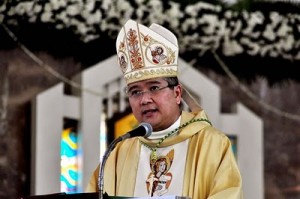Bishops propose prayer for peace to ‘calm anxieties’ over Mamasapano incident
CAGAYAN DE ORO CITY – The leadership of the Catholic Bishops Conference of the Philippines (CBCP) has proposed that an Oratio Imperata for Peace be said in churches throughout the country to help “calm the anxieties” of the people and arrest the continued stirring for war after the tragic Jan. 25 incident in Mamasapano, Maguindanao.
“The situation of the country and the world right now calls on all of us to turn to the Lord in humble supplication and gather our people to pray,” Lingayen-Dagupan Archbishop and CBCP President Socrates B. Villegas wrote in a Feb. 23 letter to the country’s bishops.
“As the nation continues to grieve over the tragedy in Mamasapano and the family of nations is threatened by war and terror from extremist groups, our best contribution to the nation and to the world is to encourage people to pray,” Villegas added.
In Catholic Church tradition, an Oratio Imperata is an obligatory prayer said during times of natural calamity, war or any grave danger to the community.
The bishops in every ecclesiastical territory have the authority to declare that such prayer be made obligatory.
Article continues after this advertisementVillegas’ letter to his colleagues included a draft eight-paragraph text of the obligatory prayer. He proposed that this be said before the post-communion prayer in every Holy Mass from March 1 to 28.
Article continues after this advertisementThe prayer written by Villegas implored that the people develop an “awareness of the massive forces of violence and terrorism that threaten our world today.”
“Grant us a sense of urgency to activate the forces of goodness, of justice, of love and of peace in our communities,” the prayer partly reads.
“… I humbly request that you issue a circular to the clergy and Catholic faithful in your jurisdiction to make this prayer for peace mandatory,” Villegas asked the country’s bishops.
“Hopefully this prayer can calm the anxieties of our long suffering people and touch the hearts of the enemies of peace,” Villegas added.
